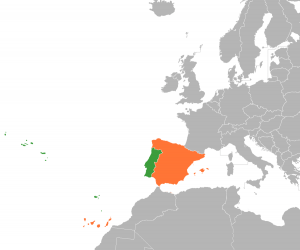A second residence in Spain or Portugal: the definitive comparative study
22 Oct 2018
Admittedly, they are in a rather close embrace, there on the Iberian Peninsula. But that does not mean that Spain and Portugal belong to the same pot. You will notice the same if you have your eye on a second home in Spain or Portugal.
For starters, Spain is about five times larger than Portugal. The two relate as big brother and the little, sometimes annoying rascal.
Portuguese make nostalgia and melancholy almost an art form -
saudade - while Spaniards are noisier, but also turn their gaze more toward the future.
And further: different language, different time zone, different culinary delights and a different mentality among the population - the aspects that divide Spain and Portugal are at least as pronounced as the ones that unite them.

Their respective real estate markets also differ markedly. Read on for the ultimate comparative study between Spain and Portugal.
Culture
Tastes and colors, we know. But one thing we can state objectively is that Portugal's culture is homogeneous, Spain's is not.
Regional differences are a lot smaller in Portugal than in Spain.
España is a melting pot of cultures and nationalities that have left their influence there over the centuries. Spain is several countries in one. The culture is richer, more diverse.
For example, compare Basque Country with Andalusia and the differences are giant, both culinary and in terms of traditions, dance, and so on.
[caption id="attachment_2060" align="aligncenter" width="300"]

Flamenco: what does a Basque know about it?[/caption]
Don't break a Basque's mouth about flamenco, because his traditional folk dance looks completely different. Don't ask it to make paella - that's a dish from Valencia. He is more likely to get his mouth watering from salted cod,
pintxos and tuna casseroles.
You wouldn't ask an Antwerper for his recipe for Gentse waterzooi, would you?
Portugal has much less of that split. There, from Braga to Faro, you will find roughly the same culture.
Climate
The differences between the two are minute.
Spain is larger and thus has more variation in geography and climate. Northern Spain is cooler, while Andalusia is home to just about the hottest cities in Europe. The south is truly sweltering hot. The Mediterranean climate of the East, including the Costa Blanca, has been declared the healthiest in the world by the World Health Organization (WHO).
[caption id="attachment_2065" align="aligncenter" width="300"]

The Costa Blanca: healthiest climate in the world.[/caption]
Portugal is vast along the Atlantic Ocean. Many major cities are located on the coast. So the variation in climate is less pronounced. The influence of the ocean cools things down, although you won't notice it much during summer heat days. Summer lasts six months in the Algarve and Lisbon. The capital has an average January temperature of 11 degrees Celsius. Winters there are mild and humid.
Culinary
Tapas, jamón iberico, gambas with garlic, tortillas, the molecular cuisine that reigns supreme: in Spain, every little foodie has an excellent time.
Portugal contrasts that with a hearty café culture, especially in Lisbon, alongside Porto's famous port wine, Belém's sweet pastries and lots of seafood. Cod is the fish of choice, in croquettes, stews or simply grilled with lemon and herbs. In general, Portuguese cuisine tends to be fresher and a bit lighter, Spanish relies a bit more on meat.
[caption id="attachment_2061" align="aligncenter" width="300"]

Pastéis de Belém: Portuguese delicacy.[/caption]
You can eat good food in both countries, let there be no doubt about that.
But, without wanting to knock too much on the same nail, Spain is bigger. As a result, Spanish cuisine is more diverse. Delicacies vary from region to region. Paella, gazpacho and cold garlic soup in the south, hot and savory stews in the "cold" north.
Spanish wines are also firmly valued internationally and should not be inferior to French or Italian. Not to mention the Spanish sherry, aged in oak barrels.
Beaches
The appeal of Spanish beaches is already in the name. Costa del Sol, the coast of the sun. Costa Blanca, the white coast - named for its pearly beaches.
Spain's southern beaches are among the sunniest in the world. On the Costa Blanca, the sun shines even 320 days a year. No wonder the beaches are not only among the most attractive, but sometimes the busiest in Europe. Especially in summer, you sometimes lie with your towel on the surface of a handkerchief.
Fortunately, there are many to choose from: no country has more Blue Flag beaches. This is an independent seal of approval that rates beaches for safety and water quality. Thanks to this abundance, quiet beaches can also be found, including in the small fishing villages of Galicia and Andalusia.
Sandy beaches, azure waters, dramatic cliffs, romantic creeks: Spain offers something for every beach bunny. It is no different in Portugal. Many of the most beautiful beaches are near cities like Lisbon, making them very accessible. The waves of the Atlantic Ocean also make surfers feel like a, uh, fish in the water in Portugal.
[caption id="attachment_2066" align="aligncenter" width="300"]

Surfers feel at home in Portugal.[/caption]
Life cost
Both Spain and Portugal are significantly cheaper than Belgium. On average, the Portuguese price level dives just a bit deeper than the Spanish one. Portugal is about 11 percent cheaper than Spain. Especially when it comes to shopping and eating out, Portugal offers great value for little money. Then again, in Spain, clothes, cars and gasoline are cheaper.

Last but not least, especially if you are thinking of working abroad: wages in Spain are a lot higher than in Portugal. Thus, a higher Spanish cost of living there is not necessarily synonymous with less purchasing power. And certainly not if you are living on a Belgian income: restaurants in Spain are about 35 percent cheaper than in our country, shopping will cost you about 30 percent less.
Language
Spanish is much easier to learn than Portuguese. Especially since you will be less likely to switch to English. The bulk of Spaniards cannot yet order a pint of beer in the language of Shakespeare. Exception: major cities, coasts and other tourist attractions.
Many Portuguese do speak English because they don't have dubbed movies and series rammed down their throats. They do have that unsympathetic habit in Spain. And you really don't want to know what Homer Simpson sounds like in Spanish. Or just did.
https://www.youtube.com/watch?v=m2HgeQ8A2eQ
So anyway, we actually wanted to talk about Spanish. That language is relatively easy to master and opens up a whole new world. Literally: you can find your way not only in Spain, but in just about the entire Latin American continent. So it is also simply a more useful language to know.
And even if you have to make a habit of pronouncing a v as a b, you will never have to tie your tongue in a fourteen-inch knot. Which is the case with Portuguese: that language sounds to the layman like Spanish with a Russian accent.
Transportation and infrastructure
Portugal is smaller, we said. The Alfa Pendular, Portugal's high-speed train, stops in all major cities. Although it often does not drive at too high a speed. Portugal is more compact and most people live on the coast. As a result, everything is close by.
In Spain, things are a little different. The size of the out-of-touch neighboring country ensures that the Spanish hst does not stop in all major cities. The focus is more on capital Madrid anyway. On the other hand, all major Spanish cities are connected by low-cost buses.
And public transportation within cities and regions does noticeably better in Spain than in Portugal anyway. You only have to put the metro maps of Lisbon and Barcelona side by side to realize that. Consider also the user-friendly, inexpensive coastal streetcar on the Costa Blanca.
[caption id="attachment_2059" align="aligncenter" width="300"]

The coastal streetcar on the Costa Blanca: user-friendly and inexpensive.[/caption]
Portugal's infrastructure is much less developed than Spain's. Regional trains are worn down to the wire, traffic on Lisbon's bridges shuffles forward agonizingly slowly. The subway offers little relief: the network is far too small for a city of that size.
No, then the Spanish traffic network is much better equipped. The country tet countless highways, many of them new and not too busy. Spain also has many brand-new airports, a result of pathological jealousy among regional politicians. As an expat, take advantage of it.
Anyway, it is easier and cheaper to get to Spain - more airports, more cheap flights. Which is not to say it should cost a bomb of money to land in Portugal, but the options are scarcer.
Healthcare
Spain has one of the best health care systems - not just in Europe, but in the world. The World Health Organization (WHO) ranked the system number seven globally. Nice touch: health care is free, even for foreigners. The Spanish government finances it all with taxes.
The effect is clear: Spanish men live to an average of 80.1 years, women 85.5 years. Only in Japan are the oldies more gritty.

Portugal's health care system is only slightly below that, number twelve according to WHO. Life expectancy for men and women there is 78.2 and 83.9, respectively. In Portugal, you do have to pay a small sum to use it.
Buy property
Both countries regularly score high in lists of people looking to escape to the sun. Both Spain and Portugal are sought after by investors with an eye for foreign real estate. Among other things, the attractive prices for residential stakes mean that the Iberian twins have great potential for project development.
More so, international real estate agencies usually place Spain and Portugal side by side in their top five best European countries to buy real estate. The reasons are obvious: the prices of apartments, houses or villas are going up there, with no limit already in sight.
The trees, in other words, are once again growing to the sky. Those who invest there now can sink back into a beach chair with a cocktail in hand and watch their investment increase in value.

Sounds suspiciously like the same song that led to an unprecedented economic crisis a decade ago?
Don't panic. The hangover caused by that crisis has long since crept back into its pen. Spain and Portugal snapped out of the doldrums. Key indicators, including house prices, again indicate growth. Real estate finds buyers quickly and the bulk of residential property represents good value for the money.
And as Johan Cruijff put it: every advantage has its disadvantage. The crisis made both governments more critical in accrediting construction companies, which raised the overall quality. Of course, it is best to deal only with reliable real estate agents and developers.
A second residence in Spain or Portugal: a comparison
- Prizes. Of course, the cost of housing depends very much on the desired region and even neighborhood, both in Spain and Portugal. Banded together, Portuguese real estate is a bit cheaper, though. This is not to say that Spain is expensive: even there you get much more value for money than in Belgium.
- Offering. In Spain, as an investor, you have much more choice of affordable properties.
- Additional cost. These are slightly higher in Spain than in Portugal. Notably, the notary costs more. You will also feel the transfer tax for existing residences, or the registration fees for new residences harder on your wallet in Spain. On the other hand, other legal costs are often higher in Portugal, as well as the VAT due on new buildings.
- Hypthetics. Loan opportunities are similar in both countries. In Portugal, however, it is more difficult to effectively get one - the conditions there are stricter.
- Taxes. Are usually somewhat lower in Portugal, but much depends on the type of property involved.
Conclusion
Both Spain and Portugal have enormous potential for market growth, a warm and sunny climate and a safe community. In other words, both countries are pleasant places for expats to live.
We prefer the always sunny costas in Spain, because of the language, the infrastructure and especially the wide choice of ready-to-use apartments, houses and villas. You too? Then we can help you find your dream home under the Spanish sun. Contact us without obligation.
 Their respective real estate markets also differ markedly. Read on for the ultimate comparative study between Spain and Portugal.
Their respective real estate markets also differ markedly. Read on for the ultimate comparative study between Spain and Portugal.
 Flamenco: what does a Basque know about it?[/caption]
Don't break a Basque's mouth about flamenco, because his traditional folk dance looks completely different. Don't ask it to make paella - that's a dish from Valencia. He is more likely to get his mouth watering from salted cod, pintxos and tuna casseroles.
You wouldn't ask an Antwerper for his recipe for Gentse waterzooi, would you?
Portugal has much less of that split. There, from Braga to Faro, you will find roughly the same culture.
Flamenco: what does a Basque know about it?[/caption]
Don't break a Basque's mouth about flamenco, because his traditional folk dance looks completely different. Don't ask it to make paella - that's a dish from Valencia. He is more likely to get his mouth watering from salted cod, pintxos and tuna casseroles.
You wouldn't ask an Antwerper for his recipe for Gentse waterzooi, would you?
Portugal has much less of that split. There, from Braga to Faro, you will find roughly the same culture.
 The Costa Blanca: healthiest climate in the world.[/caption]
Portugal is vast along the Atlantic Ocean. Many major cities are located on the coast. So the variation in climate is less pronounced. The influence of the ocean cools things down, although you won't notice it much during summer heat days. Summer lasts six months in the Algarve and Lisbon. The capital has an average January temperature of 11 degrees Celsius. Winters there are mild and humid.
The Costa Blanca: healthiest climate in the world.[/caption]
Portugal is vast along the Atlantic Ocean. Many major cities are located on the coast. So the variation in climate is less pronounced. The influence of the ocean cools things down, although you won't notice it much during summer heat days. Summer lasts six months in the Algarve and Lisbon. The capital has an average January temperature of 11 degrees Celsius. Winters there are mild and humid.
 Pastéis de Belém: Portuguese delicacy.[/caption]
You can eat good food in both countries, let there be no doubt about that.
But, without wanting to knock too much on the same nail, Spain is bigger. As a result, Spanish cuisine is more diverse. Delicacies vary from region to region. Paella, gazpacho and cold garlic soup in the south, hot and savory stews in the "cold" north.
Spanish wines are also firmly valued internationally and should not be inferior to French or Italian. Not to mention the Spanish sherry, aged in oak barrels.
Pastéis de Belém: Portuguese delicacy.[/caption]
You can eat good food in both countries, let there be no doubt about that.
But, without wanting to knock too much on the same nail, Spain is bigger. As a result, Spanish cuisine is more diverse. Delicacies vary from region to region. Paella, gazpacho and cold garlic soup in the south, hot and savory stews in the "cold" north.
Spanish wines are also firmly valued internationally and should not be inferior to French or Italian. Not to mention the Spanish sherry, aged in oak barrels.
 Surfers feel at home in Portugal.[/caption]
Surfers feel at home in Portugal.[/caption]
 Last but not least, especially if you are thinking of working abroad: wages in Spain are a lot higher than in Portugal. Thus, a higher Spanish cost of living there is not necessarily synonymous with less purchasing power. And certainly not if you are living on a Belgian income: restaurants in Spain are about 35 percent cheaper than in our country, shopping will cost you about 30 percent less.
Last but not least, especially if you are thinking of working abroad: wages in Spain are a lot higher than in Portugal. Thus, a higher Spanish cost of living there is not necessarily synonymous with less purchasing power. And certainly not if you are living on a Belgian income: restaurants in Spain are about 35 percent cheaper than in our country, shopping will cost you about 30 percent less.
 The coastal streetcar on the Costa Blanca: user-friendly and inexpensive.[/caption]
Portugal's infrastructure is much less developed than Spain's. Regional trains are worn down to the wire, traffic on Lisbon's bridges shuffles forward agonizingly slowly. The subway offers little relief: the network is far too small for a city of that size.
No, then the Spanish traffic network is much better equipped. The country tet countless highways, many of them new and not too busy. Spain also has many brand-new airports, a result of pathological jealousy among regional politicians. As an expat, take advantage of it.
Anyway, it is easier and cheaper to get to Spain - more airports, more cheap flights. Which is not to say it should cost a bomb of money to land in Portugal, but the options are scarcer.
The coastal streetcar on the Costa Blanca: user-friendly and inexpensive.[/caption]
Portugal's infrastructure is much less developed than Spain's. Regional trains are worn down to the wire, traffic on Lisbon's bridges shuffles forward agonizingly slowly. The subway offers little relief: the network is far too small for a city of that size.
No, then the Spanish traffic network is much better equipped. The country tet countless highways, many of them new and not too busy. Spain also has many brand-new airports, a result of pathological jealousy among regional politicians. As an expat, take advantage of it.
Anyway, it is easier and cheaper to get to Spain - more airports, more cheap flights. Which is not to say it should cost a bomb of money to land in Portugal, but the options are scarcer.
 Portugal's health care system is only slightly below that, number twelve according to WHO. Life expectancy for men and women there is 78.2 and 83.9, respectively. In Portugal, you do have to pay a small sum to use it.
Portugal's health care system is only slightly below that, number twelve according to WHO. Life expectancy for men and women there is 78.2 and 83.9, respectively. In Portugal, you do have to pay a small sum to use it.
 Sounds suspiciously like the same song that led to an unprecedented economic crisis a decade ago?
Don't panic. The hangover caused by that crisis has long since crept back into its pen. Spain and Portugal snapped out of the doldrums. Key indicators, including house prices, again indicate growth. Real estate finds buyers quickly and the bulk of residential property represents good value for the money.
And as Johan Cruijff put it: every advantage has its disadvantage. The crisis made both governments more critical in accrediting construction companies, which raised the overall quality. Of course, it is best to deal only with reliable real estate agents and developers.
Sounds suspiciously like the same song that led to an unprecedented economic crisis a decade ago?
Don't panic. The hangover caused by that crisis has long since crept back into its pen. Spain and Portugal snapped out of the doldrums. Key indicators, including house prices, again indicate growth. Real estate finds buyers quickly and the bulk of residential property represents good value for the money.
And as Johan Cruijff put it: every advantage has its disadvantage. The crisis made both governments more critical in accrediting construction companies, which raised the overall quality. Of course, it is best to deal only with reliable real estate agents and developers.










